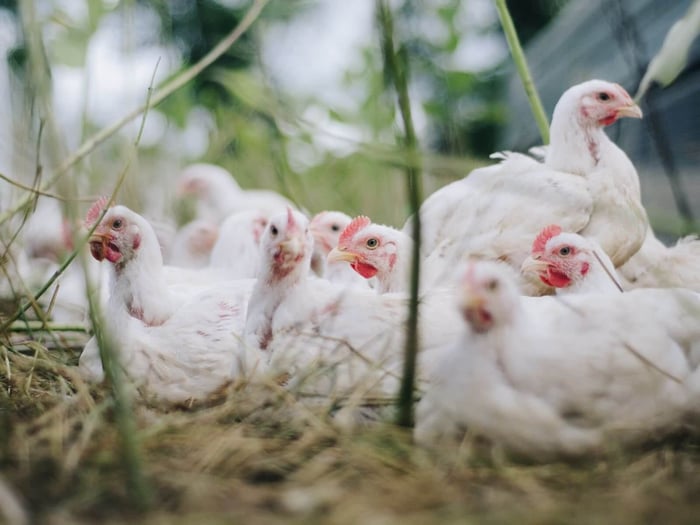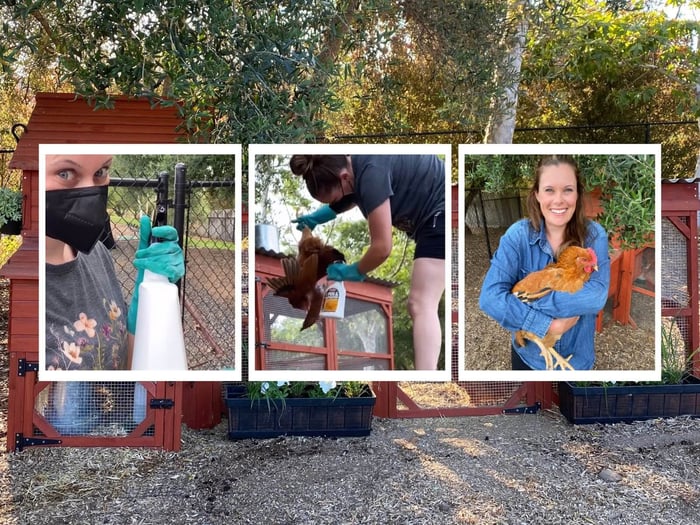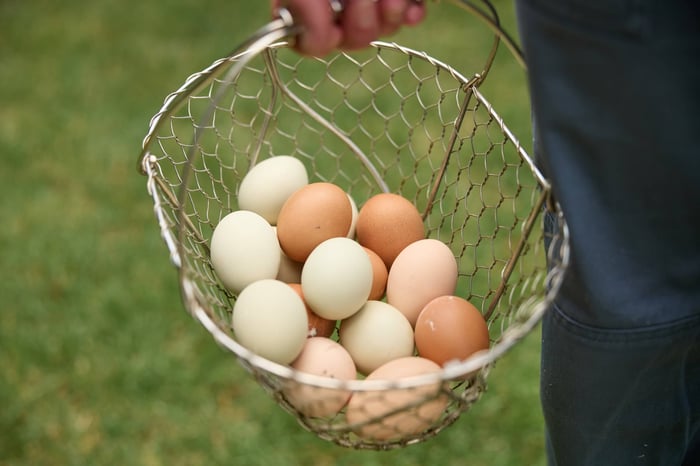Table of Contents
How to Stop Chickens from Eating Eggs: Prevention, Solutions, and Long-Term Care
For many backyard chicken keepers, collecting fresh eggs is one of the most rewarding parts of raising a flock. But eventually, there will come a time when you walk out to the coop and discover broken eggs in the nesting box—and worse, your chickens happily pecking away at them?! Egg-eating is one of the most frustrating habits chickens can develop. Once they’ve acquired a taste for raw eggs, it’s almost impossible to stop the behavior, and in some cases, you may have to remove that chicken from the flock entirely. That’s why learning how to stop chickens from eating eggs before it becomes a habit is so important.
In this guide, I’ll walk through why chickens eat eggs, what you can do to prevent it, and the strategies that have worked to protect both my flock and my egg basket. This is something I would definitely add to the ever-growing list of ‘things I wish I knew before getting chickens.’ That being said, I am happy to have learned my lesson, and help someone else who might be dealing with the same problem. Let’s dive in!
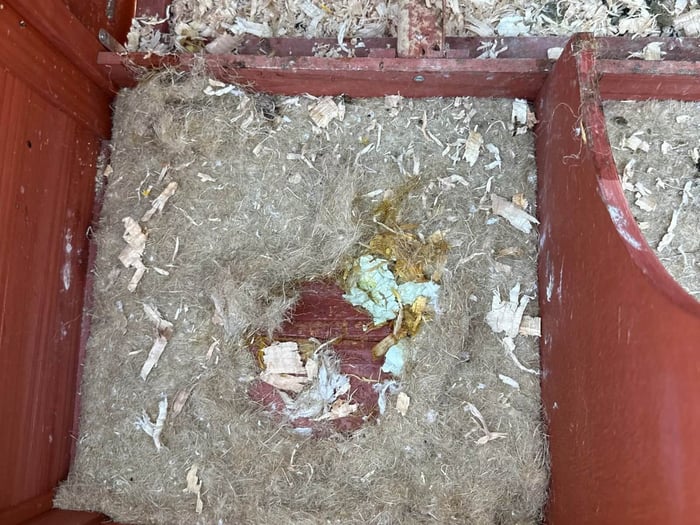
Why Do Chickens Eat Eggs?
Egg-eating usually starts by accident. A hen may step on an egg, causing it to crack, or it may roll against the side of the box and break. Once the yolk is exposed, curious chickens will peck at it. After all, it’s a fresh, protein-packed treat.
Here are the most common reasons chickens start eating eggs:
Broken Eggs: Thin-shelled eggs or weak nesting materials can cause eggs to crack easily. Once a chicken tastes yolk, the habit can quickly escalate.
Nutrient Deficiency: Hens low in calcium or protein may seek out eggs as a way to supplement their diet.
Stress and Boredom: A crowded coop, lack of enrichment, or not enough nesting boxes can all contribute to destructive behaviors.
Curiosity: Chickens are natural foragers and peck at just about anything. Unfortunately, one curious peck at an egg can set off a chain reaction.
Understanding these root causes will help you take steps toward prevention and long-term solutions. That way, you know immediately how to stop chickens from eating eggs - before it gets out of hand.
Quick Action: Clean Up Broken Eggs Immediately
The number one rule of how to stop chickens from eating eggs is simple: never let them get a taste in the first place. If an egg breaks in the nesting box, clean it up immediately. Remove all traces of the yolk and replace any soiled bedding. Chickens are smart and have excellent memories. If they learn eggs are an available food source, they will actively seek them out.
This isn’t just a warm-weather problem either. If your hens lay during the winter, it’s just as important to collect eggs quickly. Cold temperatures can cause eggs to freeze, crack, and expose the yolk—creating the same temptation for chickens to peck and eat them. A frozen egg can start the habit just as easily as a broken one in summer.
Winter tip: When temperatures drop below freezing, check your nesting boxes at least twice a day. Frozen or cracked eggs can encourage the same bad habit you’re trying to prevent.
As someone who’s kept chickens for years, I can tell you how quickly this can escalate. I’ve had mornings where I didn’t get out to the coop right away and found an entire egg gone, with only a few specks of shell left. Once a hen learns that pecking an egg brings a tasty reward, it’s nearly impossible to untrain that behavior. Prevention really is the only cure here.
Nesting Box Setup Matters
Another important part of how to stop chickens from eating eggs is the nesting box setup. A well-designed box helps protect the eggs and lowers the risk of breakage.
Soft Bedding: Cushioned bedding, like hemp nesting pads, helps absorb impact and prevents eggs from cracking. Many chicken keepers love hemp for its natural odor control and composting benefits, but not every flock responds the same way.
Proper Size and Design: Nesting boxes that are too shallow or too large can contribute to egg breakage. Chicken Coop Company coops are built with nesting boxes sized for comfort and safety, helping hens feel secure while reducing the chance of cracked eggs.
Cleanliness: Dirty nesting boxes can discourage hens from laying properly, increasing the chance of eggs being stepped on or damaged. The removable trays and easy-to-clean design in our coops make it simple to keep the boxes fresh.
A Quick Personal Lesson
I’ll be honest—this is a mistake I made myself when I was still figuring things out. I tried hemp nesting pads because so many chicken keepers swear by them. They’re cushioned, compostable, and help with odor control. But my hens had other plans.
Instead of settling in, my hens scratched every bit of hemp out of the nesting boxes until they were bare. One morning, I walked out to find a yolk-filled mess and most of the egg gone—likely eaten. I’d read enough stories in chicken groups to know that once a flock develops a taste for eggs, the habit is hard to break. It was a clear reminder of how important it is to stop chickens from eating eggs before it ever becomes routine.
The lesson I learned? Hemp pads are a great option for many flocks, but not all. My hens turned out to be picky, and I downright frustrating! Every flock is different, so sometimes it takes a little experimenting to find what works best.
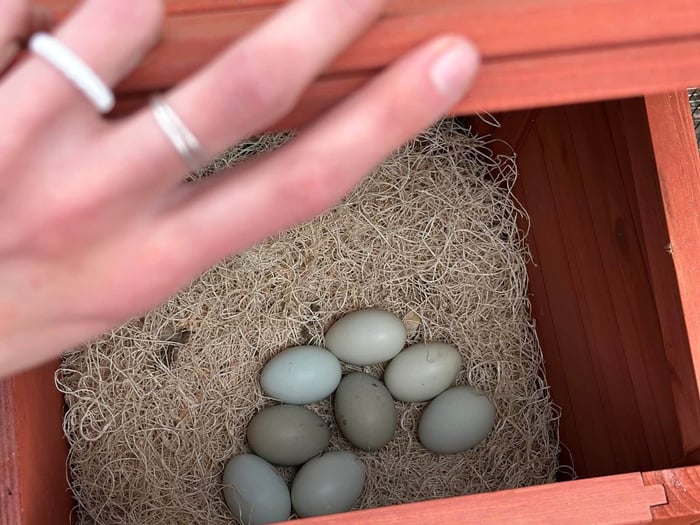
Diet and Nutrition: Strong Shells Prevent Breakage
Many cases of egg-eating can be traced back to weak shells. A soft-shelled egg cracks more easily, making it an easy target for chickens. You don't have to stop chickens from eating eggs if their shells are strong and not easily broken from hens moving around in the nesting box. Ensuring your flock has the right nutrition is one of the most effective ways to strengthen shells and reduce breakage.
Calcium: Provide a constant source of calcium through crushed oyster shells or recycled eggshells. Fun fact: eggshells themselves are an excellent calcium supplement when properly cleaned, baked, and crushed.
Protein: Hens that don’t get enough protein may turn to eggs as a food source. High-quality layer feed, supplemented with occasional treats like mealworms or cooked eggs, helps prevent this.
Balanced Diet: Fresh greens, grains, and treats are great, but make sure they’re not replacing the essential nutrients in a formulated feed.
This is where it’s important to make a distinction: while raw eggs in the coop are dangerous, cooked eggs are perfectly safe and even healthy for chickens. In fact, scrambled eggs are a great way to support a sick or molting hen with extra protein. The key is to make sure they never associate raw eggs in the nest with food.
Enrichment and Environment
Sometimes egg-eating is more about boredom than nutrition. Chickens are curious, active animals, and if they don’t have enough stimulation, they’ll find ways to entertain themselves. Unfortunately, that might mean pecking at eggs.
Here’s how to keep your flock busy and content:
Provide Enough Space: Overcrowding increases stress and bad habits. Each bird should have at least 4 square feet inside the coop and 10 square feet in the run.
Add Enrichment: Hanging cabbages, treat balls, or chicken swings give your flock healthy distractions.
Increase Nest Boxes: Aim for at least one nesting box for every 3–4 hens. Too few boxes can lead to squabbles, broken eggs, and unwanted pecking.
By giving your chickens a comfortable, stimulating environment, you reduce the chances of destructive behaviors like egg-eating taking hold.
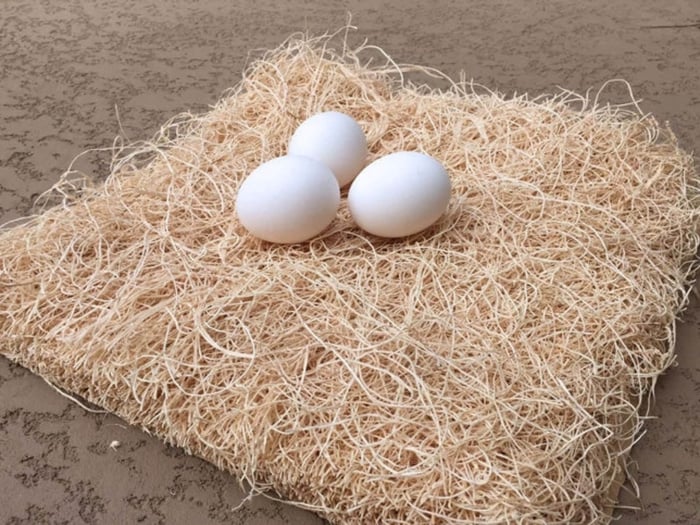
Long-Term Prevention: Consistency Is Key
Learning how to stop chickens from eating eggs isn’t about one quick fix—it’s about creating a long-term strategy that reduces risk.
Collect eggs frequently, ideally twice a day.
Use roll-away nesting boxes or cushioning pads to prevent breakage.
Keep nesting boxes clean and appealing.
Provide proper nutrition with a steady supply of calcium and protein.
Clean up any broken eggs immediately, leaving no residue behind.
These small, consistent habits go a long way in preventing a problem that’s almost impossible to reverse once it starts.
When the Habit Can’t Be Broken
Unfortunately, not every case can be solved. If a hen develops a strong habit of egg-eating, she can teach the behavior to the rest of the flock. This is when tough decisions may need to be made.
Some chicken keepers separate the offender, while others may cull her entirely. It’s never an easy choice, but protecting the rest of the flock and your egg supply is often the priority. This is why prevention is always the best strategy.
Remember: Prevention Is Your Best Tool
Learning how to stop chickens from eating eggs can feel overwhelming, but prevention really is the most effective strategy. With the right coop setup, proper nutrition, and quick action when accidents happen, you can usually stop the problem before it ever becomes a habit.
Chickens can absolutely benefit from eggs in the right form. Cooked eggs are a safe protein boost, and crushed shells provide valuable calcium. But once a hen gets a taste of raw egg in the nesting box, it can start a cycle that’s nearly impossible to break.
In my own experience, my hens have taught me patience, problem-solving, and even humility when they reject something I thought would be perfect—like hemp pads. Your flock may surprise you too. The key is staying observant, flexible, and ready to clean up accidents before they turn into bad habits.
When it comes to egg-eating, prevention isn’t just better than a cure—it’s the only cure.
Nesting Pads My Chickens Don't Destroy:
Chicken Nesting Pads with Aromatic Nest Herbs | Natural Excelsior Aspen Fiber Poultry Bedding | 13 x 13 Inches | Pack of 10

$ 39.99
Chicken Nesting Pads by My Favorite Chicken™ – with Aromatic Nest Herbs! Excelsior nest pads are easy to install, are completely natural and biodegradable. Excelsior poultry pads are manufactured from Great Lakes aspen excelsior fibers and brown kraft paper. Excelsior… read more
Natural Excelsior Aspen Fiber Nesting Pads | 13 x 13 Inches | Pack of 10
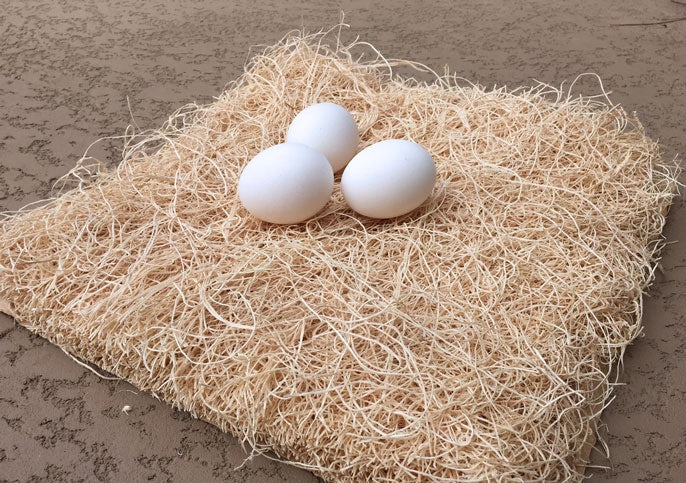
$ 34.99
The eggs are on top, clean and fresh rather than having to hunt and dig for eggs as with some other bedding or shaving products. They also draw moisture from droppings which drop to the paper below, out of the area… read more
FAQs
Can I feed my chickens eggs?
Yes, cooked eggs are a safe and healthy protein source for chickens. Raw eggs in the nest, however, can lead to bad habits.
How many nesting boxes should I provide?
Plan for one box per 3–4 hens to reduce stress, prevent crowding, and minimize the risk of broken eggs.
What should I do if I find a broken egg in the nesting box?
Clean it up immediately, remove soiled bedding, and replace it with fresh material.
Can calcium deficiency cause egg-eating?
Yes, hens lacking calcium may peck at eggs. Provide oyster shells or crushed eggshells to help strengthen shells and prevent this issue.


.png)
